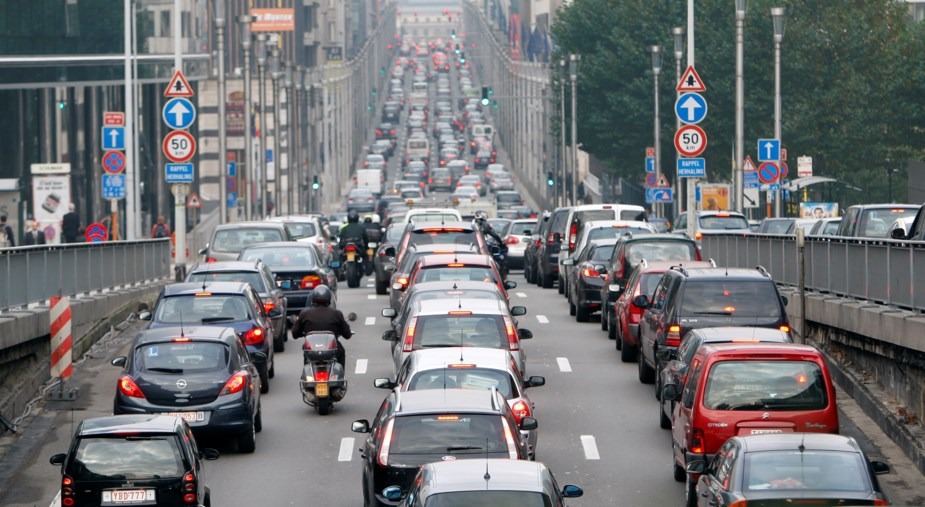The Amsterdam city council has approved a ‘clean air action plan’ to ban all fossil fuel vehicles by 2030.
The city assembly still needs to approve the plan, although it is likely to take effect at the end of this year. The council hopes for Amsterdam to become the world’s ‘capital of emissions free mobility’.
The proposed plan would also aim to save inhabitants’ lives by reducing air pollution. At the moment, Amsterdam residents lose on average lose a year of life expectancy because of it, according to data from the Global Burden of Disease.
In Brussels, a low-emissions zone was introduced in 2018, within which the most polluting vehicles are banned. Failure to comply with the criteria for access to the zone results in a 350 euros fine.
The Brussels government targets a complete ban of all diesel vehicles within the region by 2030, while in the longer term "the next step" would be a ban on all petrol vehicles, according to Brussels minister for environment Céline Frémault.
"Diesel vehicles must be banned at the latest by 2025 in Brussels and cars running on petrol or natural gas in 2030," commented Joeri Thijs from Greenpeace Belgian office last week.
"More than half of Brussels families do not have a car, but they breathe the worst air in the country and this must change," said Brussels mobility minister Pascal Smet, one of the initiators and proponents of Villo, Brussels public bicycle sharing network. Brussels' Villo network has now passed 12 million trips since its inception, and plans the rollout of electric bikes this Summer.
Amsterdam will execute its plan in different stages. Starting next year, diesel cars older than 15 years are banned from entering the inner city. From 2022, buses running on petrol or diesel will follow.
The big change will come in 2025 when the zone’s limits are expanded to the area inside the A10 ring road. At the same time, the number of banned vehicles will be expanded to include canal ferries, tour boats, trucks, vans, taxi’s and buses, as well as mopeds and scooters. By 2030, all vehicles entering the city – including cars – will need to be emissions free.
Amsterdam city counselor for transport, Sharon Dijksma (PvdA), promises subsidies for people who have their old vehicle scrapped or replace it with an electric one. The city will up the number of charging points from 3,000 now to 23,000 in 2025, including more fast chargers.
Emissions-free vehicles will get privileges like parking licenses. Norway is a leading example in the field of such privileges. The country grants electric cars access to bus lanes, more parking spaces and lower parking tariffs.
EVs becoming cheaper
“This is a good approach for better air quality. Including existing vehicles rather than only focus on cars bought new now is daring,” said Maarten Steinbuch professor in automotive technology at the University of Eindhoven.
Will the plan work and get all inhabitants to convert to electric cars? Steinbuch thinks it will. “In five years time, fossil fuel cars and electric cars will cost about the same. Electric cars will eventually even become cheaper because their engine is much less complicated.” Steinbuch expects tourists and commuters to transfer to e-mobility at the city limits.
On average, people of Amsterdam have fewer cars than the rest of Dutch inhabitants, although there are still 200.000. The city will not get 200.000 charging points, which is not a problem according to Professor Steinbuch.
“The average daily drive is 19 kilometers. Batteries are getting larger and offer a range of about 350 kilometers. You will only need to charge a few times a week or use a fast charger for fifteen minutes.”
Exemplary role
City Counselor Dijksma feels the city’s plan fits within the uniform emission zone regulations the Dutch government wants to implement.
“Our integral approach is the most ambitious approach achievable within those regulations.” Later this year, Amsterdam will already go for fewer cars in the inner city, removing 10.000 parking spots to create more room for cyclists.
Will the Dutch government accept Amsterdam’s radical approach? Steinbuch thinks it should. “There is a lot of criticism on subsidies for electric cars, but at least they make people invest in them,” pointing out that Tesla has its European HQ in Amsterdam and electric buses are produced in Valkenswaard.
The Brussels Times

